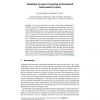KESAMSTA
2010
Springer
13 years 2 months ago
2010
Springer
Trust estimation is an essential process in several multi-agent systems domains. Although it is generally accepted that trust is situational, the majority of the Computational Trus...
KESAMSTA
2010
Springer
13 years 2 months ago
2010
Springer
Computational Trust and Reputation (CTR) systems are essential in electronic commerce to encourage interactions and suppress deceptive behaviours. This paper focus on comparing two...
KESAMSTA
2010
Springer
13 years 2 months ago
2010
Springer
A variety of business interactions in open environments can be captured in terms of creation and manipulation of social commitments among the agents. Such interactions include B2B ...
KESAMSTA
2010
Springer
13 years 2 months ago
2010
Springer
Real-time computations in multi-agent systems have been studied from different perspectives of reasoning, message passing, resource management and negotiations. Separate treatment...
KESAMSTA
2010
Springer
13 years 6 months ago
2010
Springer
Abstract. We describe and model a new aspect in the design of distributed information systems. We build upon a previously described problem on the microlevel, which asks how quickl...
KESAMSTA
2010
Springer
13 years 9 months ago
2010
Springer
The first trial of using the symmetry analysis method in modeling of behavior of complex social system is presented in this work. The evacuation of large building scenarios are d...
KESAMSTA
2010
Springer
13 years 9 months ago
2010
Springer
Abstract. In Multi-Agent System, observing other agents and modelling their behaviour represents an essential task: agents must be able to quickly adapt to the environment and infe...

